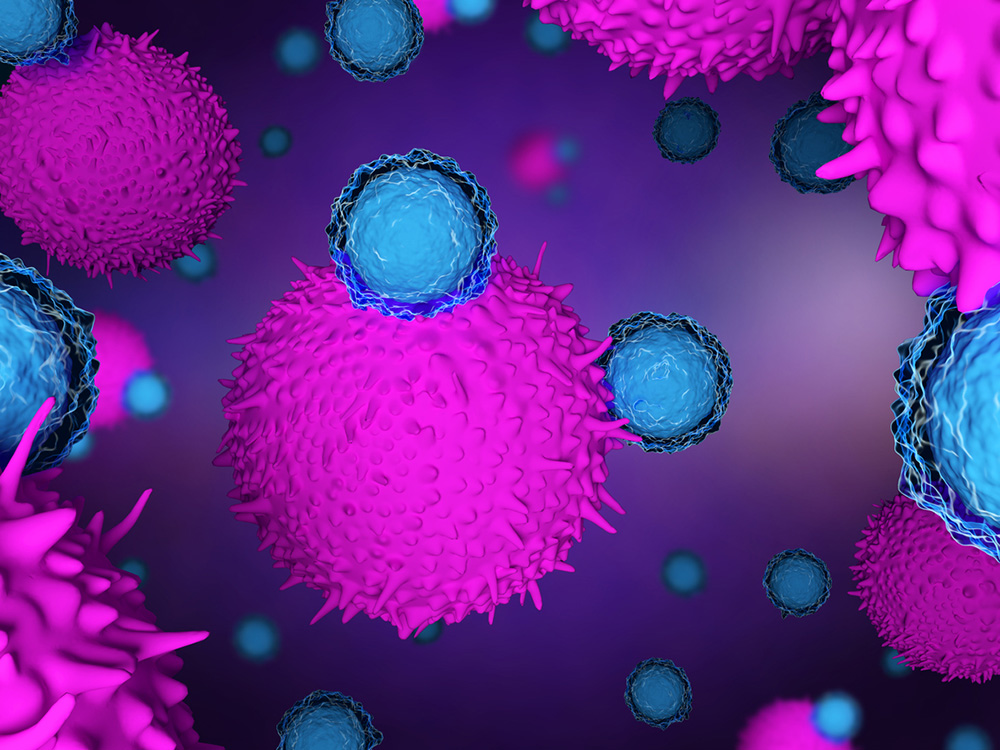
Cancer cell and gene therapy researchers have been working toward a breakthrough using already-proven treatments for solid tumors.
A CAR T-cell therapy currently being tested is showing evidence that cell and gene therapy can work for many of these difficult-to-treat cancers.
The CAR T-cell therapy, called BNT211-01, was part of a trial for a variety of solid tumors. The protein target for the therapy was CLDN6, which is found on a few different types of solid tumors.
Data from the trial shows promise for the future of CAR T-cell therapy for solid tumor cancers.
How CAR T-cell therapy works
CAR T-cell therapy is short for chimeric antigen receptor therapy. This type of cell and gene therapy takes out a patient’s T cells, modifies them genetically to add a new anticancer protein receptor, and delivers them back into a patient’s bloodstream to combat tumors.
The method has helped many patients with blood cancers, so much so that the U.S. Food and Drug Administration has approved six CAR T-cell therapies for various blood-born tumors. The same level of success has not happened for solid tumor diseases, though.
Researchers identify CLDN6 as a cell and gene therapy target on solid tumors
The BNT211-01 CAR T-cell therapy was featured in a clinical trial of 21 patients (13 having testicular cancer). Some of the other cancers represented were ovarian cancer, fallopian tube cancer, sarcoma and stomach cancer.
Approximately 93% of testicular cancers express CLDN6. A little more than half of ovarian cancers express this protein.
CLDN6 was identified as a hopeful target for two reasons:
- The protein has a loop on the outside of the cancer cell, which is visible to CAR T cells. Many unique proteins in cancer cells exist inside the cell, which is difficult for CAR T cells to target.
- The protein is not found on healthy tissue, meaning the CAR T cells will exclusively attack cancer cells. Solid tumor cells usually share proteins with healthy tissue cells, and the CAR T cells can struggle to differentiate between cancer cells and healthy cells.
CAR T cell therapy puts brakes on solid tumors
The trial’s results speak to the effectiveness of targeting CLDN6 with CAR T-cell therapy.
The overall response rate among the 21 patients was 33%, meaning one-third (7) of patients had their tumor shrink or disappear on scans. One patient’s tumor was eliminated, and six had their tumors shrink thanks to the treatment.
Another seven patients had a stable disease, meaning their tumor stopped growing but didn’t shrink either. The disease control rate (preventing the cancer from growing or spreading any further) was 67%.
CAR T-cell therapy progress for treating cancer
Alliance for Cancer Gene Therapy (ACGT) has been a leader in supporting cell and gene therapy for all types of cancer. ACGT financially backed the development of CAR T-cell therapies for blood cancers and was instrumental in the first FDA approval of a CAR T-cell therapy.
ACGT continues to support cell and gene therapy scientists by issuing grant funding to bold and innovative research proposals. 100% of all donations go toward funding these research programs. Alliance for Cancer Gene Therapy is also committed to informing the public about the potential of cell and gene therapy through news articles, videos and more.
You can help ACGT continue to publish articles like this that highlight important advancements in cancer treatment. Please consider donating today if you have enjoyed reading this content or other articles on our website. Another option is signing up for our monthly newsletter.
Page sources
- BioNTech Presents Encouraging Phase 1/2 Follow-up Data for CAR-T Candidate BNT211 in Hard-To-Treat Solid Tumors at ESMO. Yahoo. Retrieved from: https://www.yahoo.com/now/biontech-presents-encouraging-phase-1-143000094.html. Accessed: 09/12/2022.



